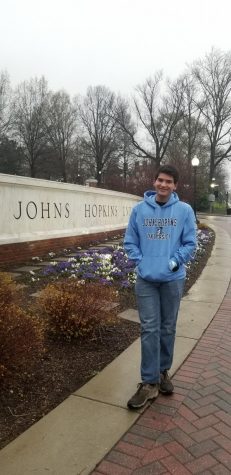Model U.N. adapts systems to fit remote year
April 26, 2021
This has certainly been a tumultuous year for both local and international politics, something reflected in ETHS’s Model U.N. team.
Model U.N. typically consists of a series of committee and General Assembly meetings, which work towards writing papers and passing resolutions that benefit everyone; this year, these meetings have looked quite different.
“Normally, we would be either at another high school, university or a big hotel convention center in a room with between 20 people, for one of the smaller committees, and 100 to 150 people, for the big General Assemblies. We’d be jam-packed in with each other and… we would get up, go talk to each other and try to come up with working papers. Obviously, there’s a lot of room for transmission in there, so it’s been a pretty drastic change,” Model U.N. President and senior Jonathan Zenkich said.
The largest events Model U.N. typically competes in, Saint Ignatius Model U.N. (SIMUN) and Model U.N. of the University of Chicago (MUNUC), have both taken place online this year, which can result in day-long meetings sitting at home; a far cry from the socialization the club typically promotes.
“There are some positive changes to it in the sense that stuff is more accessible because we can go to committees that are based in Georgia or in California, but, obviously, you’re missing that component of being in person where a lot of what you get done: you go up to a person and introduce yourself and you start a conversation…. There’s no replacement for it,” Zenkich said.
To help remedy this lack of connection, ETHS has hosted several in-house committees, only featuring team members, to both allow existing members to see each other compete and help recruit underclassmen.
“The biggest thing this year, which I think that a lot of clubs are dealing with, is an issue with recruiting underclassmen. It’s really hard to do that on Zoom and Model U.N. always has kind of been a pretty small club and most of them are seniors…. That’s kind of what we’ve been working on with the crisis committees, to recruit new members, because they’re fun, light, happy, exciting and anyone can get involved. It’s also easier to do than like a Zoom General Assembly, which is difficult,” senior Sofia Hletko said.
Despite these challenges, Model U.N. has continued to learn and speak about pressing issues such as vaccine distribution during a pandemic and maritime navigation and trade policies.
“When I’m on a committee, I spend time researching what’s going on. Last year, I was talking about corruption in developing nations. I got a country that I’d never heard of before, and I just learned all about it… Before that, I was researching protesters’ rights and a major issue going on in Hungary with underpaying workers and overworking them, which I would never have wondered about but Model U.N. definitely gave me a reason to look into it,” Hletko said.
Zenkich explains that, when it comes down to it, Model U.N. is all about learning to have meaningful dialogues that work towards a successful resolution, something anyone can get behind.
“You’re going to have more productive, more fulfilling experiences if you relate to both the politics and the social aspect,” Zenkich said. “You’re forced to be knowledgeable about the policies that you’re discussing, but you also have to hone in your people skills. Dialogue is just learning how to have a little bit of charm and get things done.”










